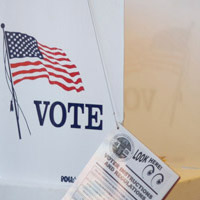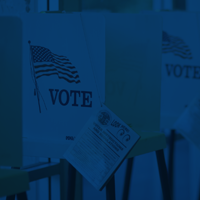
With studies showing that Americans’ confidence in their government is at an all-time low, MacArthur has been exploring ways that grantmaking can help strengthen the institutions of U.S. democracy. A well-functioning, effective democracy is essential to good public policy which, in turn, is crucial to the Foundation’s success in most areas of its work, ranging from community development to conservation.
The Foundation awarded nine grants totaling $4.8 million to advance this work, which is particularly important during this election year. Several of these grants will help support nonpartisan organizations that analyze data on political campaign contributions, provide legal expertise to local and state officials on the public financing of campaigns, and monitor the federal agencies that have oversight responsibilities for elections. One grant supports informal and substantive policy discussions by members of Congress from across the political spectrum. Other grants seek to make the elections of judges more transparent and to address the reliability of voting systems and make polling place practices more secure.
“In recent years, we’ve seen an increasing disconnect between the policy solutions recommended by experts and the ability of our political system to address those ideas in a meaningful way,” said MacArthur Foundation President Robert Gallucci. “With these grants we add MacArthur’s voice and resources to those of others seeking to ensure that our government can respond more effectively to the issues that matter most to our collective well-being and future.”
The nine new grants are:
- A grant of $1.8 million will fund the Aspen Institute’s Congressional Program, which invites serving members of Congress from both parties to participate in open discussions on critical policy topics with experts from leading think tanks and universities.
- A $500,000 grant will support the Brennan Center for Justice’s Democracy Program in conducting research, policy analysis, legal advocacy, and public education on campaign finance reform and voting.
- The Campaign Legal Center will receive $500,000 to provide legal expertise regarding financing disclosure laws, campaign finance regulations, and related public education and media outreach.
- An award of $400,000 will allow the Center for Responsive Politics to maintain its national campaign finance databases, publish original research, develop new online tools, and provide training on campaign finance information to journalists and the general public.
- The Committee for Economic Development, a group of 200 senior corporate executives and university leaders, will use its $300,000 grant to conduct research and hold roundtables for its members on campaign giving, corporate disclosure, and other matters related to business and political campaigns.
- The Democracy 21 Education Fund will use its $200,000 grant to provide legal expertise relating to campaign finance laws, oversight regulatory bodies, and public policy, education, and communications efforts.
- Justice at Stake will receive $400,000 for its efforts across the United States to preserve and strengthen the fairness, impartiality, and transparency of the court system.
- Aided by its $400,000 grant, the National Institute on Money in State Politics will collect, analyze, and publish campaign finance data reported by 16,000 state-level candidates, recommend best practices for full state disclosure, and train journalists to investigate trails of influence.
- The Verified Voting Foundation will receive $300,000 in support of its nationwide effort to analyze and improve the security of election practices and voting systems currently in use ahead of the 2012 elections.



